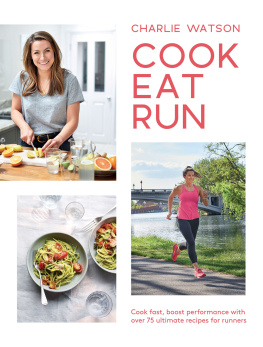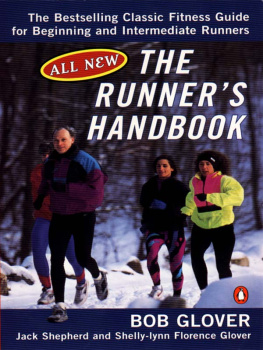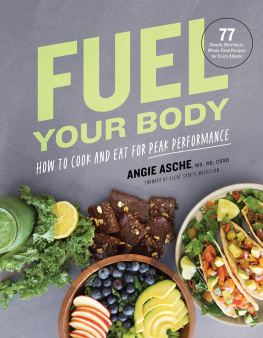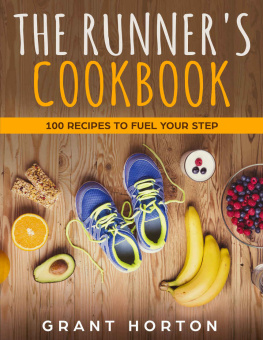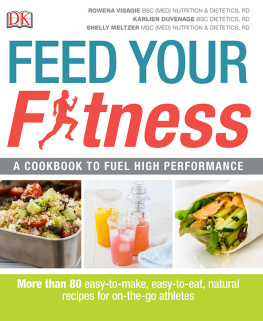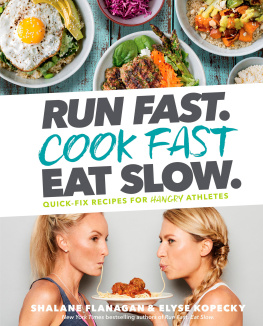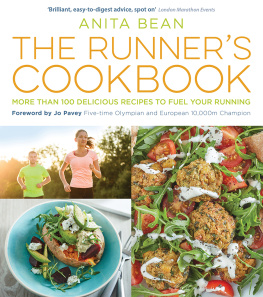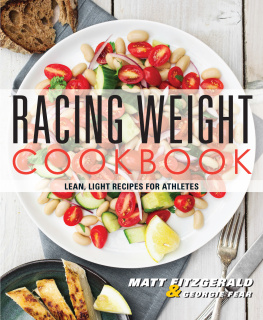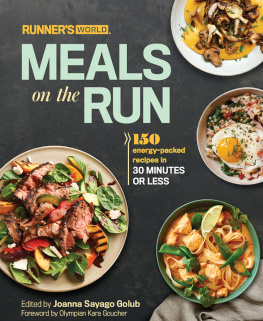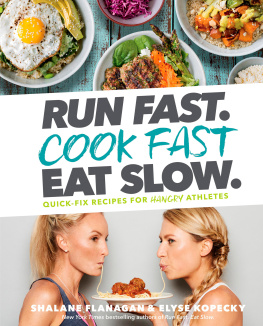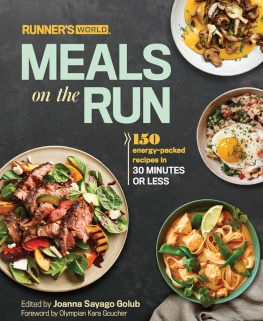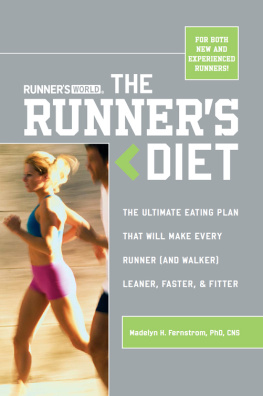


Contents


I wrote this book after being inspired by Shalane Flanagan and Elyse Kopeckys book Run Fast, Cook Fast, Eat Slow. I loved their recipes and the concept behind the book, and wanted to create my own version that included speedy suppers, on-the-run fuel and post-workout meals, as well as baked goods. I wanted to put into action the recipe-writing skills taught to me by my friend and mentor Meike Beck at Good Housekeeping magazine, and combine them with the knowledge gained during my four-year dietetics degree, and share it in a simple, easy-to-digest format (metaphorically and physically speaking).
Nutrition can get so overcomplicated, with specialist ingredients and confusing, often seemingly contradictory, science. This book is aimed at runners of all levels even those who are struggling to call themselves runners right now (side note: if you run, youre a runner, no matter your pace or distance). Whether youre building up for your first 5K, have decided to run a marathon, or are training for any length in-between (or beyond), I hope this book inspires you to get into the kitchen and rethink your nutrition, and encourages you to keep working towards your goals.
I started running because of grief. Losing one of my best friends, Vic, to depression at the end of our university days was my first experience of loss and I took it hard. Ten years ago, talking about mental health issues, or just not being OK, was more taboo. I wanted to do something positive in memory of him, to honour his life and, importantly, to raise funds and awareness for those struggling with their own mental health. So, I signed up for the 2011 London Marathon, with no real clue about how far a marathon was.
After being accepted onto the MIND team, I exaggerated and said I had already started training. That evening I went for my first run and made it just 100 metres down the street before having to stop and pretend to stretch. I was embarrassed to be so out of breath in front of the teens standing at the bus stop nearby.
Undeterred, I soon discovered running blogs, found a Hal Higdon beginner marathon training plan, and started to lace up my trainers three or four times per week. Unfortunately, my inexperience meant that I didnt stretch, strength- or cross-train, and so I found myself injured just a few weeks before the marathon that year. Luckily, I was able to defer my place and trained with renewed confidence, fitness and enthusiasm for the next year.
I finished my first marathon, the 2012 London Marathon, in 4 hours 54 minutes and 59 seconds. I didnt fuel during that first race no gels, just a couple of sweets grabbed from course spectators. But there was no never again moment after crossing that finish line. I knew immediately that not only did I want to do it again, but next time I wanted to run faster.

In the beginning, I would get back from a long run and immediately tuck into a packet of chocolate biscuits (usually eating the whole pack) with a cup of tea. Unsurprisingly, I put on weight. I thought that running long distance would mean the pounds just dropped off. But I changed my training completely for my second marathon, completing more speed workouts, cross-training, hitting the gym, and learning more about what to eat. I lost weight during that period, simply from changing my training and eating more mindfully.
In 2013 I ran the New York City Marathon, finishing in 4.09.45 a 45 minute improvement and on a much hillier course. Ive since completed all six Marathon Majors (London, Berlin, Chicago, New York, Tokyo and Boston), earning a Six Star Finisher Medal, and dropped my personal best marathon time to 3.38. Im hopeful that by the time you read this it will be sub-3.30 or close!
It was around the time of the New York City Marathon that I started to research more about what I should be eating to support my training, and translating what I was learning about nutrition from magazines and websites into healthier meals. I was working at Good Housekeeping at the time, writing and testing recipes for the magazine and website, and so my new interest in health found its way into the food, recipes and recommendations we were making in the magazine.
I was also discovering how much misinformation is out there and just how confusing the world of nutrition can be. Few of the blogs I was reading were backed up with any scientific credentials. I discovered that, while anyone can call themselves a nutritionist without any formal credentials, in the UK a dietitian is a protected title. To become a Registered Dietitian you have to complete a three- to four-year degree course. I was fortunate to get some sound advice from Rosie Saunt (co-founder of The Rooted Project and author of Is Butter a Carb?), who was training to be a dietitian at the time. Im forever grateful to her for setting me on the path to becoming a Registered Dietitian myself.
When many people think about dietitians, they often think about helping patients to lose weight or stick to specific diets; they dont always think about those that cant eat. As part of my four-year dietetics degree, I spent six months in a hospital placement. It was during that time at St Marys Hospital, London, that I discovered the clinical area I wanted to specialize in: intensive care, where a lot of patients need to be tube-fed until they recover enough to eat or can be transferred to long-term care facilities.
I had been nervous about spending time in the intensive care unit (ICU), especially at the trauma centre, because most of their patients were men who had either attempted suicide or had very bad falls. Tragically, I have lost two good friends in this manner and I worried that I wouldnt cope dealing with the patients and families, that it might bring back memories and that I wouldnt be able to do my job. However, a doctor friend asked how I would have wanted Vic and Simon to have been treated if they had made it to intensive care, and so I went into it wanting to do the best job I possibly could. I was there early for daily ward rounds, read extra papers, volunteered to see additional patients and even wrote my dissertation on ICU feeding protocol. I was helped hugely by my ICU mentor Ella Terblanche, one of the most passionate and knowledgeable dietitians Ive ever met. I loved the role and I felt I could make a real difference.
When I tell people that Im studying dietetics, they often ask me about what they should be eating. While every person is different, the one piece of advice I share with everyone is to EAT REAL FOOD. By this, I mean minimally processed foods as close to their natural form as possible.

